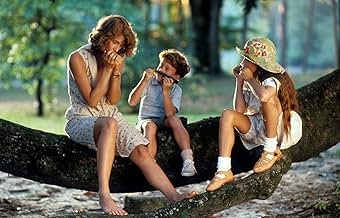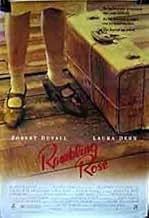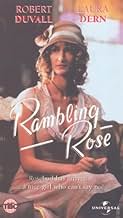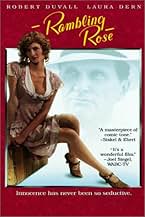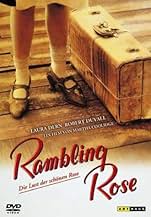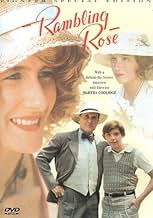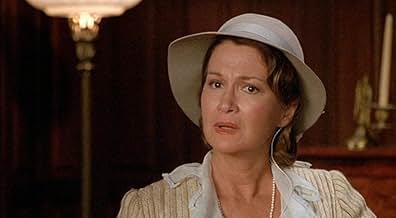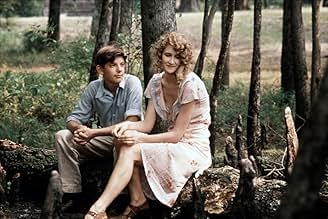ÉVALUATION IMDb
6,5/10
5,6 k
MA NOTE
Une jeune femme qui respire la sexualité se bat contre la tentation.Une jeune femme qui respire la sexualité se bat contre la tentation.Une jeune femme qui respire la sexualité se bat contre la tentation.
- Nommé pour 2 oscars
- 6 victoires et 15 nominations au total
Robert John Burke
- Dave Wilkie
- (as Robert J. Burke)
Taylor Sutherland
- Billy
- (as Matt Sutherland)
Robin Robertson
- Young Salesman
- (as Robin Dale Robertson)
John Ratch Hart
- Crowd Person
- (uncredited)
Histoire
Le saviez-vous
- AnecdotesDiane Ladd and Laura Dern's Oscar nominations mark the first time a mother and daughter ever received such an accolade for appearing in the same film. The only other time that a parent and child received acting nominations for the same film was when Henry Fonda and Jane Fonda were both nominated for La maison du lac (1981).
- GaffesWhen Rose is in bed with Buddy, the shot of the two of them shows her left arm being under the covers, and immediately the next shot is a closeup of Rose and her left arm is up and behind her head.
- Autres versionsIn the UK, the BBFC removed around thirty seconds from the scene where 15 year-old Lukas Haas and Laura Dern are in bed together. This was judged to be in breach of the Protection of Children Act, which forbids the use of minors in sexual contexts on-screen. Despite this, the BBC have broadcast the uncut version several times and the cuts were later fully waived for the 2002 Guild DVD release.
- Bandes originalesDixie
Music and Lyrics by Daniel Decatur Emmett
Performed by Louis Armstrong and The Dukes of Dixieland
Courtesy of MAJ Music, Inc.
Published by MAJ Music, Inc. (ASCAP)
Administered by Larry Spier, Inc.
Commentaire en vedette
My review was written in July 1991 after watching the film at a Times Square screening room.
Calder Willingham's memoir of the South "Rambling Rose" allows a talented ensemble to deliver the year's best screen acting so far. Funny and moving tale of an oversexed young woman will attract class audiences after its film festival exposure and has the potential to cross over to mainstream hit status.
It is difficult to conjure up another actress to embody Rose better than Laura Dern, whose tall, angular figure and striking (rather than beautiful) face under a row of curls personifies the naive title character.
She's a girl from the wrong side of the tracks who starts her life over as maid to the family of Robert Duvall and Diane Ladd in a small Georgia town in 1935. Rose is under a cloud, and it turns out that rumors of having been forced into prostitution at a tender age are true.
Both Duvall and his 13-year-old son Luka Haas are immediately taken by Dern's raw sexuality, yet it is the boy who nearly has his first conquest with her when Dern innocently gets in bed with him one night in a funny and risque scene.
Duvall is a proper gentleman, rejecting Dern's attempt at seduction and quickly adopting a fatherly concern for her. Family matriarch Ladd (Dern's real-life mom) is a Yankee educated at Columbia University, who also takes Dern under her wing and defends the girl under all circumstances.
Main source of conflict is Dern's promiscuous activities, which cause young men to loiter outside the house at all hours. This brings Duvall no end of grief in dealing with his uncontrollable charge.
Film climaxes in a classic scene involving Dern's future following her pregnancy scare that turns out to be an illness. Duvall and a stern Yankee doctor (terrifically played by Kevin Conway) come to a gentleman's agreement that a radical hysterectomy will end her loose ways. When Ladd stands up for the girl's rights, eliciting an apology and emotional turnaround from Duvaol, the film's main themes have been driven home with uncommon force and precision.
Pic is bookended by a scene of John Heard in 1971 portraying Haas grown to middle age, recalling the story and learning of Rose's fate from his aged father. Device is the film's weakest link but does not detract from the power of the main footage.
Dern's naturalness in a very eccentric role confirms the promise of her earlier work and makes Rose one of the most memorable characters in recent cinema. Duvall and Ladd play off each other to perfection, with Duvall maximizing all the humor inherent in author Willingham' odd turns of phrase.
The wide-eyed innocence and curiosity Haas brings to hsis rites-of-passage assignment are remarkable and help avoid the potential tastelessness in Dern's "robbing the cradle" scene with him. As his younger siblings, Lisa Jakub and Evan Lockwood also are affecting.
Director Martha Coolidge and herf technical crw have recreated the detail and texture of southern life with great feeling, filming this Carolco-financed picture at Carolco's Wilmington, North Carolina studio (formerly owned by the defunct De Laurentiis Entertainment Group). Like "Driving Miss Daisy", this quaint setting allows moral issues to be developed with subtlety rather than the inevitable didactic approach of a modern story.
Elmer Bernstein's warm musical accompaniment is a key asset to the film, but Nat King Cole's '60s pop hit "Rambling Rose" is not used on the soundtrack.
Depending on the impact of the year-end releases, "Rambling Rose" stands a good chance of being remembered come awards time. Pic has its world premiere August 22 as the opening night selection at the Montreal Film Festival.
Calder Willingham's memoir of the South "Rambling Rose" allows a talented ensemble to deliver the year's best screen acting so far. Funny and moving tale of an oversexed young woman will attract class audiences after its film festival exposure and has the potential to cross over to mainstream hit status.
It is difficult to conjure up another actress to embody Rose better than Laura Dern, whose tall, angular figure and striking (rather than beautiful) face under a row of curls personifies the naive title character.
She's a girl from the wrong side of the tracks who starts her life over as maid to the family of Robert Duvall and Diane Ladd in a small Georgia town in 1935. Rose is under a cloud, and it turns out that rumors of having been forced into prostitution at a tender age are true.
Both Duvall and his 13-year-old son Luka Haas are immediately taken by Dern's raw sexuality, yet it is the boy who nearly has his first conquest with her when Dern innocently gets in bed with him one night in a funny and risque scene.
Duvall is a proper gentleman, rejecting Dern's attempt at seduction and quickly adopting a fatherly concern for her. Family matriarch Ladd (Dern's real-life mom) is a Yankee educated at Columbia University, who also takes Dern under her wing and defends the girl under all circumstances.
Main source of conflict is Dern's promiscuous activities, which cause young men to loiter outside the house at all hours. This brings Duvall no end of grief in dealing with his uncontrollable charge.
Film climaxes in a classic scene involving Dern's future following her pregnancy scare that turns out to be an illness. Duvall and a stern Yankee doctor (terrifically played by Kevin Conway) come to a gentleman's agreement that a radical hysterectomy will end her loose ways. When Ladd stands up for the girl's rights, eliciting an apology and emotional turnaround from Duvaol, the film's main themes have been driven home with uncommon force and precision.
Pic is bookended by a scene of John Heard in 1971 portraying Haas grown to middle age, recalling the story and learning of Rose's fate from his aged father. Device is the film's weakest link but does not detract from the power of the main footage.
Dern's naturalness in a very eccentric role confirms the promise of her earlier work and makes Rose one of the most memorable characters in recent cinema. Duvall and Ladd play off each other to perfection, with Duvall maximizing all the humor inherent in author Willingham' odd turns of phrase.
The wide-eyed innocence and curiosity Haas brings to hsis rites-of-passage assignment are remarkable and help avoid the potential tastelessness in Dern's "robbing the cradle" scene with him. As his younger siblings, Lisa Jakub and Evan Lockwood also are affecting.
Director Martha Coolidge and herf technical crw have recreated the detail and texture of southern life with great feeling, filming this Carolco-financed picture at Carolco's Wilmington, North Carolina studio (formerly owned by the defunct De Laurentiis Entertainment Group). Like "Driving Miss Daisy", this quaint setting allows moral issues to be developed with subtlety rather than the inevitable didactic approach of a modern story.
Elmer Bernstein's warm musical accompaniment is a key asset to the film, but Nat King Cole's '60s pop hit "Rambling Rose" is not used on the soundtrack.
Depending on the impact of the year-end releases, "Rambling Rose" stands a good chance of being remembered come awards time. Pic has its world premiere August 22 as the opening night selection at the Montreal Film Festival.
- lor_
- 24 juin 2023
- Lien permanent
Meilleurs choix
Connectez-vous pour évaluer et surveiller les recommandations personnalisées
- How long is Rambling Rose?Propulsé par Alexa
Détails
Box-office
- Budget
- 7 500 000 $ US (estimation)
- Brut – États-Unis et Canada
- 6 266 621 $ US
- Fin de semaine d'ouverture – États-Unis et Canada
- 314 631 $ US
- 22 sept. 1991
- Brut – à l'échelle mondiale
- 6 266 621 $ US
- Durée1 heure 52 minutes
- Couleur
- Mixage
- Rapport de forme
- 1.85 : 1
Contribuer à cette page
Suggérer une modification ou ajouter du contenu manquant



